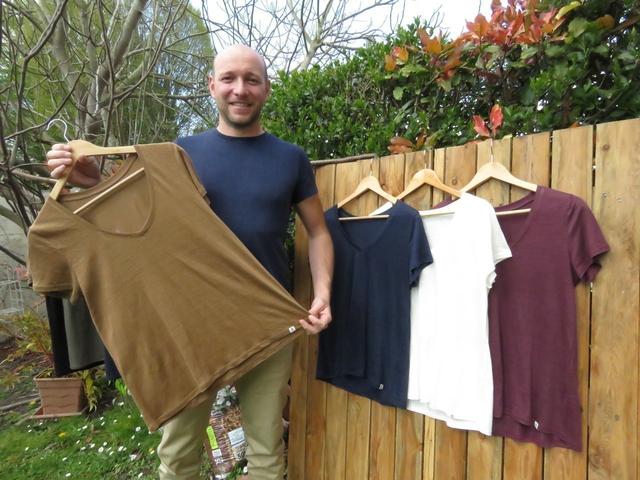Normandy: a cooperative relaunches the production of linen t-shirts<
Producing linen clothes in large series in Normandy, the idea still seemed absurd before the Covid-19 pandemic. Our country may well be the world's leading producer of this plant fibre, but 80% of production goes to Asia, Turkey or Central Europe to be spun and then knitted, since the last French spinning mills closed their doors in 2005. projects to relocate the sector had remained in the minds of certain textile professionals since the end of the 2010s, the health crisis accelerated the movement.
Notably at Linportant, a production cooperative launched in 2019 in Normandy. Its goal: to manufacture 100,000 T-shirts each year. With its eight employees and organic flax grown in the plain of Caen, it began to produce masks (15,000 pieces) from the first confinement. “With the pandemic, we realized that we were still able to produce textiles in large series in France. And not only haute couture, welcomes Paul Boyer, general manager of Linportant. By imagining that we had launched in the current context and not in 2019, we would have aimed bigger. Maybe the million T-shirts a year.”
This article can be found in WE DEMAIN n°34, available on newsstands and on our online store.
In Normandy, a skilled workforce
If Linportant was able to launch, it is because the successive waves of relocation have not yet completely destroyed the sector in France. Scutching cooperatives, the first stage of flax processing, still exist in large numbers. The country still has industrial designers, a skilled workforce. She remains at the forefront of the fashion industry with many world famous brands. “We just lack spinning mills and clothing workshops positioned in ready-to-wear,” points out Paul Boyer.
Things my mother taught me: Save EVERY plastic grocery bag. EVERY SINGLE ONE! Things my mother *should* have taugh… https://t.co/If7BN2BWYp
— Taylor Wilson Sat Apr 13 20:16:55 +0000 2019

Exactly, spinning projects are beginning to multiply in France. The Emanuel Lang company is going to open a flax spinning mill in Alsace. And Safilin plans to reopen a flax spinning unit on its historic lands in Hauts-de-France. The creation in France of a new organic flax sector – which also requires very little water – would restore meaning to a sector crushed by globalization.
READ ALSO: Bike, jeans, toothbrush: 3 products again made in France
Major brands interested in French linen
The Lin et chanvre bio association works on supply contracts between farmers, spinning mills and clothing workshops on a local scale. “We could thus imitate the very significant financial risk that we take by switching to organic farming, explains Méline Schmit, in the midst of converting her farm on the Calvados coast. This will also help us to promote the organic side of our flax production. Which is difficult for products with a long processing circuit“, continues the young flax farmer. At the other end of the sector, clothing brands such as 1083 or Le Slip Français are committed alongside farmers, within the Linpossible collective. Objective: to promote made in France by sourcing primarily from French spinning mills and manufacturers.
As a positive effect, the relocation of production allows these brands to reduce part of their distribution and marketing costs. Ralph Lauren, Promod and H&M have announced plans to use more French linen in their collections. “At the beginning of 2020, at the start of the pandemic, China stopped exporting to Europe, recalls Paul Boyer. It made fashion heavyweights aware of the fragility of their supply chains. And the importance of securing them a minimum by repatriating part of their production to the European continent.” Therefore, isn't imagining that 10% of linen clothes bought in France being made in France in the near future more economic rationality than utopia?
READ ALSO: Relocating textiles to France would halve its carbon footprint
Share the post "Normandy: a cooperative relaunches the production of linen t-shirts"


 Tags:
Tags: Prev
Prev







